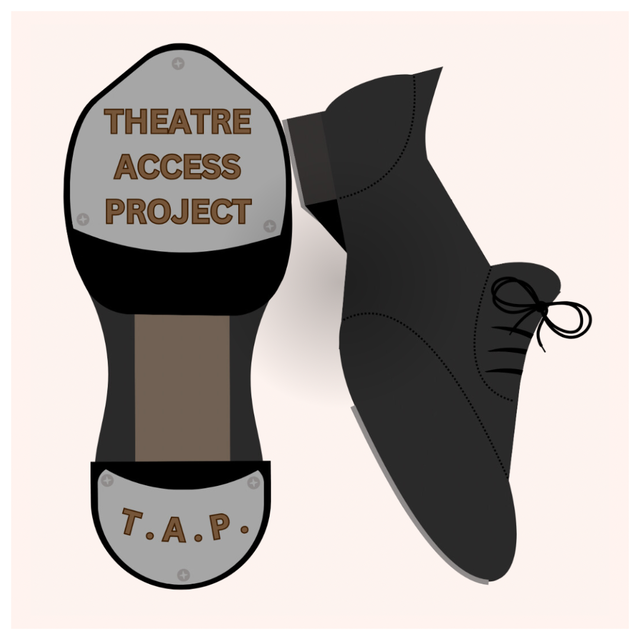An Introduction to The Theatre Access Project
04.12.24
The Theatre Access Project (T.A.P) is a group of theatre reviewers with different lived experiences of access related barriers, sharing their tips to help others in the community, and addressing the challenges they face. The aim of T.A.P. is to raise awareness of accessibility in theatre through varying perspectives to shed light on these difficulties, in the hope that it helps others who may also be struggling or needing advice.
Four wonderful creatives make up the T.A.P team, each with an array of stories to tell. The hope is that we will be sharing posts on a quarterly basis in line with the theatrical seasons, to improve accessibility for all in the arts. Below, the T.A.P team share their experiences and the improvements they think the industry could be making.
Ruby (@anxioustheatregoer) is a university student who has anxiety and writes content specific reviews after realising that trigger warnings are often not detailed enough.
“For many, receiving a set of trigger warnings just before the show begins can make the experience even more stressful, and so it is important that these are provided in advance, and in as many formats as possible. They should also share cue sheets if a patron requests more information. Many shows have inflexible readmittance policies which means that, in overwhelming environments, people are unable to come or go as they may need to. The common justification is that this would be disruptive to the show, however it is far more harmful to force someone to sit through a panic attack and consequently need to leave and miss the rest of the show. Certain productions do require more managed exits and entrances to ensure safety of cast and crew etc. however this can still be managed accessibly.”
Sam (@stagemasters_1) is a theatre blogger and influencer, last year, Sam's wife was diagnosed with a connective tissue disorder for which there is no cure. This has meant they have to look at this world through an accessible lens to cater for her needs. Learning and adapting to this has been challenging, but Sam has always believed that theatre should be accessible for everyone no matter what.
“Purchasing carer tickets can be a challenging process, and some access schemes require specific ‘proofs’ which is exclusionary of certain disabilities. As not all impairments are the same, some patrons won’t qualify for the right badges/certificates/evidence, but this doesn't mean they do not need the accommodations. Lots of organisations are currently working to change this, but it is a slow and steady process.
Finding access information about a theatre can be hard, time consuming, and ineffective. However, there are many resources available in the interim such as Euan's Guide, SeatPlan, and AccessAble, which all act as access audits to explain how a disabled person might experience each venue.”
Zoë (@stagetopageuk) is a freelance writer, in particular on her websites Stage to Page and No Safer Place. Since becoming a reviewer, she’s noticed how difficult it is to navigate this world as a disabled person and her focus is on educating PR teams, and of course advocating for wider accessibility across the board.
“The primary issue is that reviewers are often only offered one ticket. While this allocation is somewhat understandable, it’s unsafe for those who need a carer to attend a show without support. Due to the inflexibility of some PR teams in this respect, my husband waits nearby in a coffee shop or restaurant in case I needs assistance. If you speak to a venue directly, however, they’re often more than happy to accommodate you on a case-by-case basis. Unfortunately, this is also an inadequate solution as regularly no phone number or direct email is provided and, even then, these are inaccessible forms of communication for many.”
Katie Anna (@katieanna.mcconnell) trained as an actress and dancer before becoming disabled, and is now an access consultant in the theatre and events sector. Her focus is improving equity, inclusion, and authentic representation on stage and screen.
“Many theatres only provide a few wheelchair spaces, and these are often restricted view. These are regularly in the most expensive area of the auditorium with no financial subsidy offered. This is made worse in cities like the performing arts capital of London where so many venues are listed buildings.
The overwhelming lack of integrated provisions such as BSL interpretation or sensory adaptations mean that audience members reliant on these accommodations have very limited choice on when to attend. This is exasperated by the fact that each assisted performance only occurs once or twice in a run! To mitigate this, there is a fantastic piece of software called Gala Pro which provides automatic captioning and audio description at every single performance of a show via their app.”
Find out more about T.A.P here.
If you'd like to keep up to date with all our blog posts, important and interesting stories in the worlds of theatre, arts and media, plus job ads and opportunities from our industry friends, sign up to our daily media briefing at this link.



